
File Photo: Indonesian protesters hold a banner during a rally in reaction to the persecution of ethnic Rohingyas from Myanmar in Jakarta, Indonesia, May 27, 2015. (Xinhua/Agung Kuncahya B.)
by William M. Reilly
UNITED NATIONS, Sept. 13 (Xinhua) -- The plight of Myanmar's Rohingyas -- refugees alone now nearing 380,000 -- dominated on Wednesday United Nations (UN) Secretary-General Antonio Guterres' news conference preceding the annual VIP debate in the General Assembly.
While first warning the Southeast Asia crisis was destabilizing the region, it was not long after that he warned about destabilization for Northeast Asia. The nuclear and missile tests by the Democratic People's Republic of Korea (DPRK), he said, "created great instability and tension on the Korean peninsula, throughout the region and beyond."
"Our world faces major threats -- from the nuclear peril to global terrorism, from inequality to cyber-crime," Guterres said. "Hurricanes and floods around the world remind us that extreme weather events are expected to become more frequent and severe, due to climate change."
"No country can meet these tests alone," the UN chief said. "But if we work together, we can chart a safer, more stable course. And that is why (next week's) General Assembly meeting is so important."
This is his first General Assembly general debate since he became secretary-general on Jan. 1.
CATASTROPHIC HUMANITARIAN SITUATION IN MYANMAR
It was his concerns over the ethnic Muslim Rohingyas, both those in Myanmar's Rakhine State and those who fled to neighboring Bangladesh, that topped his list.
"Grievances that have been left to fester for decades have now escalated beyond Myanmar's borders, destabilizing the region," Guterres said.
Myanmar is overwhelmingly Buddhist.
"The humanitarian situation is catastrophic," he said. "When we met last week, there were 125,000 Rohingya refugees who had fled into Bangladesh," he said, adding the number of people who have left their homes and have fled to Bangladesh "has now tripled to nearly 380,000."
That concern was such that Guterres, the former head of the UN refugee agency (UNHCR), said he had written an official letter to the Security Council. He said it was the first such communication between a secretary-general and the council in 28 years.
The panel of 15 later had a briefing and consultations on Myanmar and emerged from the closed-door session to call for an end to discrimination and violence and restitution of law and order.
Guterres said he has been talking by telephone with Aung San Suu Kyi, the de facto leader of Myanmar, but not since word came that she would not attend the General Assembly session next week.
When asked if "ethnic cleansing" was the right term to apply, he asked rhetorically, "Can you find a better word?"
A crackdown by Myanmar's army, launched in response to attacks by Rohingya militants on Aug. 25, has pushed vast numbers of refugees from the stateless Muslim minority across the border with Bangladesh. The violence has incubated a humanitarian crisis on both sides of the border.
Suu Kyi has decided to cancel her UN trip and will make a speech on Sept. 19, urging national reconciliation and peace.
OTHER GLOBAL ISSUES
On Monday, the council tightened sanctions on the DPRK, squeezing oil imports and banning textile exports, following the latest nuclear test.
"I call on all member states to ensure the full implementation of this and other relevant Security Council resolutions," he said, acknowledging sanctions are not the solution.
"The solution can only be political," the UN chief said. "Military action could cause devastation on a scale that would take generations to overcome."
Asked if the Syrian civil war was over, Guterres said there were "a number of things still happening," including fighting and violence. What he feared was "fragmentation" of the nation.
Asked about what he would tell U.S. President Donald Trump, who is pulling the United States out of the Paris Agreement on climate change, Guterres said it would be no different from what he would tell anyone else.
"I do believe climate change is a serious threat," he said. "I do believe that the Paris Agreement is something that must be implemented by the international community and with an enhanced ambition."
On a darker note, he called attention to the situation in the Central African Republic, which has seen a 37 percent increase in refugees and displaced people in the last three months.
However, he said the threat of famine in Somalia, Yemen, South Sudan and northern Nigeria has been "kept at bay," despite continuing serious food insecurity.
Asked about the "rift" between Russia and the United States, Guterres said what's "important for peace and security is good relations between the United States and Russia. When relations are not good, "the whole international community suffers."
UN INSTITUTIONAL REFORM
During a nearly hour-long session with reporters here at the UN headquarters he discussed dozens of topics concerning the world body.
As for the UN budget, under threat of drastic cuts in donations by the United States, especially for peacekeeping funding, Guterres said funding for peacekeepers' "air assets" were being trimmed 15 percent.
"We cannot afford to misspend a dollar," he said.
Guterres announced the launch of his gender parity strategy for the United Nations.
"This roadmap fulfils an urgent need, a moral duty, an operational necessity and a personal priority," he said. "I have already started to do my part. Since January, over half of my appointments to the Senior Management Group have been women -- a total of 17 women and 15 men so far."
Guterres also announced the establishment of an advisory board on mediation to take on disputes. When asked which crisis "tops the list" of candidates for mediation, he said, "I think there is an opportunity in Libya, and I appeal for all countries that have an influence in Libya and all Libyans to seize this opportunity to overcome the divisions and move in the direction of a solution."

